-
 Bitcoin
Bitcoin $113900
-1.39% -
 Ethereum
Ethereum $3517
-4.15% -
 XRP
XRP $3.009
1.59% -
 Tether USDt
Tether USDt $0.9997
-0.04% -
 BNB
BNB $766.8
-1.41% -
 Solana
Solana $164.6
-2.38% -
 USDC
USDC $0.9998
-0.02% -
 TRON
TRON $0.3277
0.65% -
 Dogecoin
Dogecoin $0.2023
-1.67% -
 Cardano
Cardano $0.7246
0.05% -
 Hyperliquid
Hyperliquid $38.27
-4.77% -
 Sui
Sui $3.528
-0.52% -
 Stellar
Stellar $0.3890
-0.73% -
 Chainlink
Chainlink $16.16
-2.69% -
 Bitcoin Cash
Bitcoin Cash $539.9
-4.38% -
 Hedera
Hedera $0.2425
-2.00% -
 Avalanche
Avalanche $21.71
-0.97% -
 Toncoin
Toncoin $3.662
5.73% -
 Ethena USDe
Ethena USDe $1.000
-0.02% -
 UNUS SED LEO
UNUS SED LEO $8.964
0.35% -
 Litecoin
Litecoin $107.7
2.33% -
 Shiba Inu
Shiba Inu $0.00001223
-0.40% -
 Polkadot
Polkadot $3.617
-0.97% -
 Uniswap
Uniswap $9.052
-2.49% -
 Monero
Monero $295.1
-3.79% -
 Dai
Dai $0.9999
0.00% -
 Bitget Token
Bitget Token $4.315
-1.85% -
 Pepe
Pepe $0.00001060
0.11% -
 Cronos
Cronos $0.1342
-2.72% -
 Aave
Aave $256.0
-0.87%
What is the tax policy for Bitcoin ETF in China?
China bans Bitcoin and ETFs, making tax policies irrelevant; offshore investments carry risks, and professional advice is crucial for navigating legal complexities.
Mar 31, 2025 at 04:35 pm
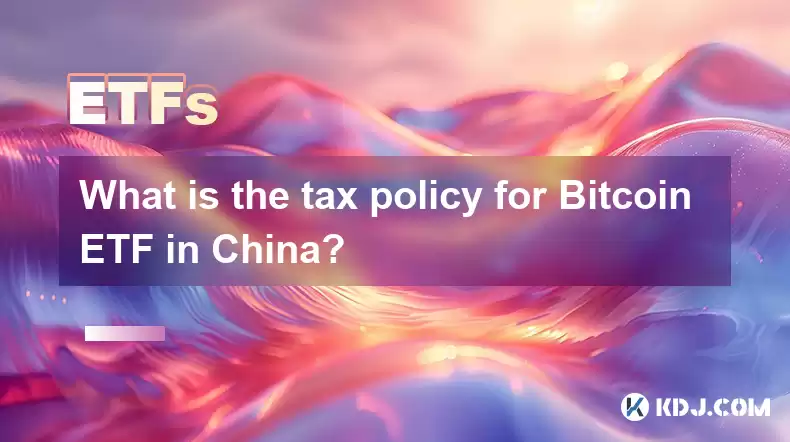
Understanding China's Stance on Cryptocurrencies and ETFs
China currently maintains a strictly prohibitive stance on cryptocurrencies, including Bitcoin. This means there is no legal framework for Bitcoin ETFs, and consequently, no specific tax policy governing them. Any trading or investment in Bitcoin is considered illegal within mainland China. This prohibition extends to all forms of Bitcoin-related activities, including the establishment and operation of Bitcoin ETFs.
The Absence of a Bitcoin ETF Tax Policy
Given the complete ban on Bitcoin trading and related activities, the question of a tax policy for Bitcoin ETFs in China becomes moot. There are no tax laws in place to address the taxation of profits or losses from such an instrument because the instrument itself is not permitted to exist. Attempting to operate or invest in a Bitcoin ETF within China would expose individuals and entities to significant legal repercussions.
Implications of the Ban on Bitcoin and Related Activities
The Chinese government's position on cryptocurrencies is rooted in concerns about financial stability, money laundering, and the potential for illicit activities. This prohibition is comprehensive, encompassing not only the direct trading of Bitcoin but also any derivative instruments, including ETFs, that derive their value from Bitcoin's price. This makes any discussion of tax implications purely hypothetical.
Potential Scenarios (Hypothetical)
While currently impossible, let's hypothetically explore potential tax scenarios if China were to ever legalize Bitcoin ETFs. This is purely speculative and should not be interpreted as a prediction of future policy. One possible scenario could involve capital gains taxes, similar to those applied to other investments. Another could involve a specific tax regime designed for digital assets.
Hypothetical Tax Treatment: Capital Gains
If a hypothetical Bitcoin ETF were legalized, one possible tax treatment would be to consider profits derived from it as capital gains. This would mean that any profits realized upon the sale of ETF shares would be subject to capital gains tax rates, which vary depending on the holding period and the investor's income bracket. This is a common approach used in many jurisdictions for investments in traditional assets.
Hypothetical Tax Treatment: Specific Digital Asset Tax
Alternatively, China might introduce a specific tax regime specifically designed for digital assets, including Bitcoin ETFs. This could involve different tax rates, reporting requirements, and other regulations tailored to the unique characteristics of cryptocurrencies. Such a regime would likely be complex and require detailed understanding of the regulations.
Tax Implications for Offshore Investments (Important Note)
While direct investment in Bitcoin or Bitcoin ETFs is illegal in mainland China, Chinese citizens may engage in such activities through offshore accounts or exchanges. However, it's crucial to understand that this carries significant legal and tax risks. The Chinese government may still seek to tax any gains earned from such offshore investments, even if the investment itself occurred outside of China. This could lead to complex reporting requirements and potential penalties.
Navigating the Legal Landscape: Seeking Professional Advice
Due to the complexity and evolving nature of cryptocurrency regulations, it's strongly advised to seek professional legal and tax advice before engaging in any cryptocurrency-related activities, even if conducted offshore. This is especially crucial for Chinese citizens considering any form of Bitcoin investment or trading. Failure to comply with relevant regulations could result in severe legal and financial consequences.
Hypothetical Tax Reporting (If Legalized)
Should Bitcoin ETFs ever be legalized in China, reporting requirements would likely be stringent. Investors would probably be required to report all transactions related to the ETF, including purchases, sales, and any distributions received. The exact reporting methods and deadlines would depend on the specific regulations implemented by the Chinese government. Accurate and timely reporting is crucial to avoid potential penalties.
Hypothetical Tax Implications for Institutional Investors
If Bitcoin ETFs were legalized, institutional investors, such as mutual funds and pension funds, would also face tax implications. The tax treatment for these entities would likely differ from that of individual investors. This could involve specific rules regarding the reporting of income, deductions, and other tax-related matters. Understanding these regulations would be critical for institutional investors to manage their tax liabilities effectively.
The Uncertain Future of Crypto Regulation in China
The Chinese government's stance on cryptocurrencies remains dynamic. While the current position is firmly against Bitcoin and related instruments, future developments are uncertain. Changes in regulatory policy are always possible, though currently, there are no indications of a shift toward legalization. Any potential changes would undoubtedly have significant implications for the tax treatment of Bitcoin and related investments.
Frequently Asked Questions
Q: Are Bitcoin ETFs legal in China?
A: No, Bitcoin ETFs are currently illegal in China due to the government's ban on cryptocurrency trading.
Q: What are the tax implications of investing in Bitcoin ETFs through offshore accounts?
A: Investing in Bitcoin ETFs through offshore accounts carries significant legal and tax risks. While the investment may occur outside of China, the Chinese government may still seek to tax the gains. Seeking professional advice is crucial.
Q: If Bitcoin ETFs were legalized, what type of tax would likely apply?
A: Hypothetically, if legalized, profits from Bitcoin ETFs might be taxed as capital gains or under a specific tax regime for digital assets. The exact treatment remains speculative.
Q: What are the potential penalties for illegal Bitcoin trading in China?
A: Penalties for illegal Bitcoin trading in China can be severe, ranging from fines to imprisonment, depending on the scale of the activity.
Q: Is there any indication that China might legalize Bitcoin ETFs in the future?
A: Currently, there is no indication from the Chinese government suggesting a change in its stance on cryptocurrencies or the legalization of Bitcoin ETFs.
Disclaimer:info@kdj.com
The information provided is not trading advice. kdj.com does not assume any responsibility for any investments made based on the information provided in this article. Cryptocurrencies are highly volatile and it is highly recommended that you invest with caution after thorough research!
If you believe that the content used on this website infringes your copyright, please contact us immediately (info@kdj.com) and we will delete it promptly.
- Bitcoin Strategy: Saylor's Not Hoarding, He's Building an Empire
- 2025-08-02 22:30:12
- Bitcoin Bloodbath: Macro Pressures and Liquidations Unleash Crypto Chaos
- 2025-08-02 22:30:12
- Worldcoin, Identity, WLD Price: Decoding the NYC Crypto Buzz
- 2025-08-02 21:10:12
- Shiba Inu: Utility and Community Strength Drive Crypto's Evolution
- 2025-08-02 21:50:12
- Crypto Donations, Trump PAC, and Bitcoin: A New York Minute on Political Coin
- 2025-08-02 20:30:12
- Crypto Market Under Pressure: Bearish Momentum and Rising Volatility Take Hold
- 2025-08-02 20:30:12
Related knowledge

What is the best platform to trade Bitcoin ETFs?
Jul 23,2025 at 04:14am
Understanding Bitcoin ETFs and Their Role in TradingBitcoin Exchange-Traded Funds (ETFs) have gained significant traction among traditional and crypto...

What is the best platform to trade Bitcoin ETFs?
Jul 17,2025 at 03:50pm
Understanding Bitcoin ETFs and Their Role in the MarketBitcoin Exchange-Traded Funds (ETFs) are investment vehicles that track the price of Bitcoin wi...
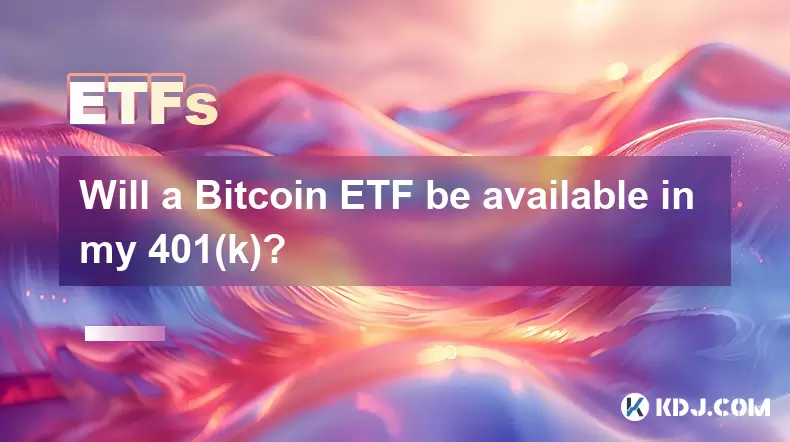
Will a Bitcoin ETF be available in my 401(k)?
Jul 17,2025 at 10:42pm
What is a Bitcoin ETF?A Bitcoin ETF (Exchange-Traded Fund) is an investment vehicle that tracks the price of Bitcoin without requiring investors to di...
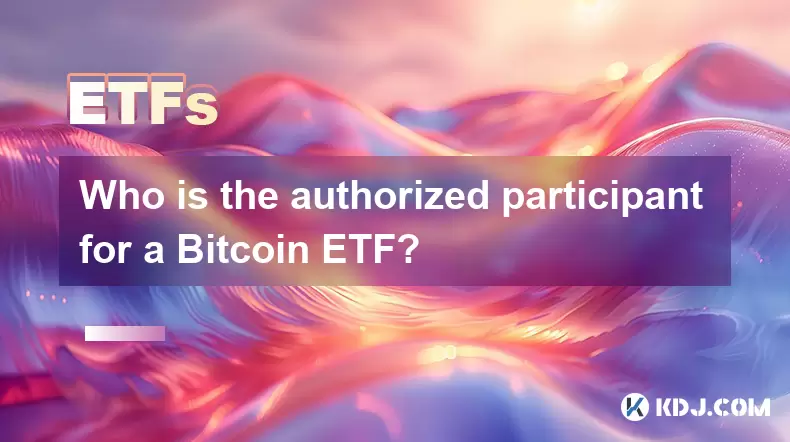
Who is the authorized participant for a Bitcoin ETF?
Jul 18,2025 at 12:42am
Understanding the Role of Authorized Participants in Bitcoin ETFsIn the context of Bitcoin Exchange-Traded Funds (ETFs), an authorized participant (AP...
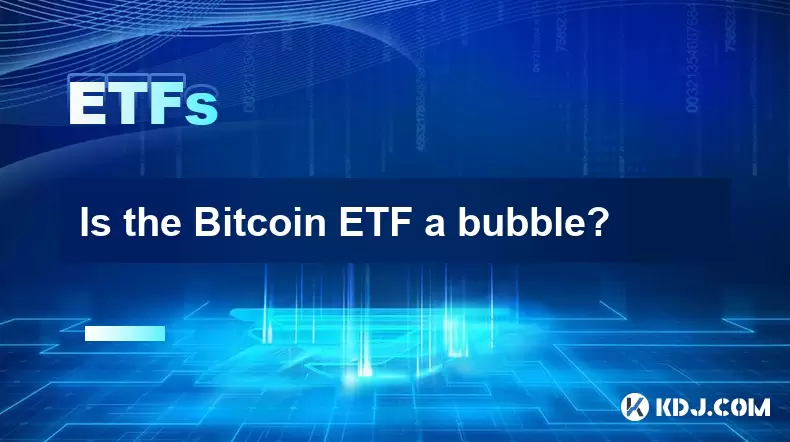
Is the Bitcoin ETF a bubble?
Jul 20,2025 at 06:57am
Understanding the Bitcoin ETF ConceptA Bitcoin Exchange-Traded Fund (ETF) is a financial product that aims to track the price of Bitcoin without requi...
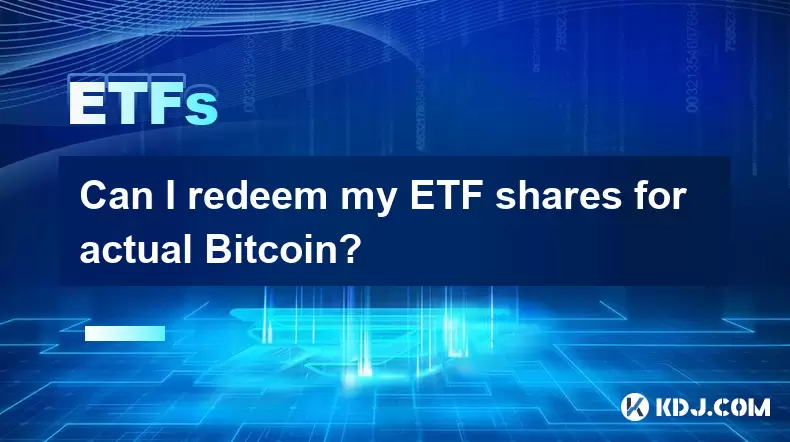
Can I redeem my ETF shares for actual Bitcoin?
Jul 17,2025 at 03:14pm
Understanding ETF Shares and Their Relation to BitcoinExchange-Traded Funds (ETFs) have become a popular investment vehicle for those looking to gain ...

What is the best platform to trade Bitcoin ETFs?
Jul 23,2025 at 04:14am
Understanding Bitcoin ETFs and Their Role in TradingBitcoin Exchange-Traded Funds (ETFs) have gained significant traction among traditional and crypto...

What is the best platform to trade Bitcoin ETFs?
Jul 17,2025 at 03:50pm
Understanding Bitcoin ETFs and Their Role in the MarketBitcoin Exchange-Traded Funds (ETFs) are investment vehicles that track the price of Bitcoin wi...

Will a Bitcoin ETF be available in my 401(k)?
Jul 17,2025 at 10:42pm
What is a Bitcoin ETF?A Bitcoin ETF (Exchange-Traded Fund) is an investment vehicle that tracks the price of Bitcoin without requiring investors to di...

Who is the authorized participant for a Bitcoin ETF?
Jul 18,2025 at 12:42am
Understanding the Role of Authorized Participants in Bitcoin ETFsIn the context of Bitcoin Exchange-Traded Funds (ETFs), an authorized participant (AP...

Is the Bitcoin ETF a bubble?
Jul 20,2025 at 06:57am
Understanding the Bitcoin ETF ConceptA Bitcoin Exchange-Traded Fund (ETF) is a financial product that aims to track the price of Bitcoin without requi...

Can I redeem my ETF shares for actual Bitcoin?
Jul 17,2025 at 03:14pm
Understanding ETF Shares and Their Relation to BitcoinExchange-Traded Funds (ETFs) have become a popular investment vehicle for those looking to gain ...
See all articles

























































































